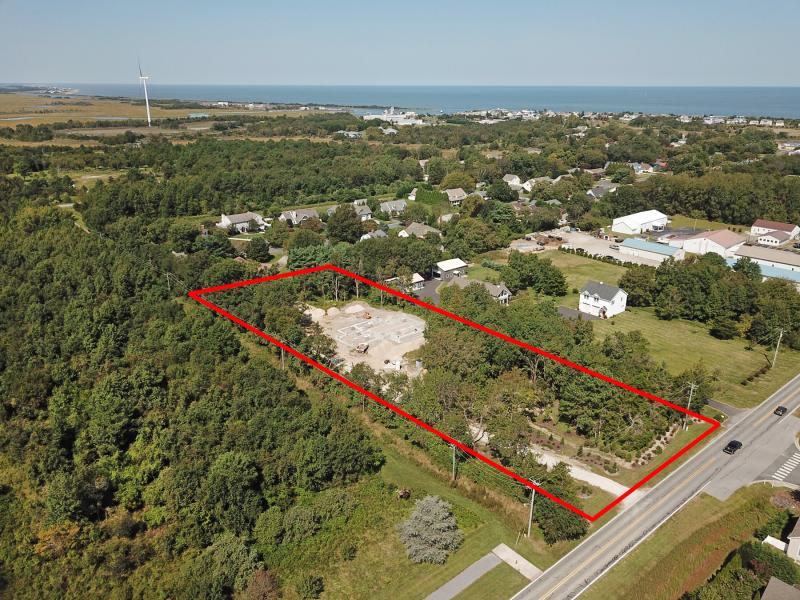A Lewes property owner is seeking dismissal of a lawsuit filed by the city that seeks to force annexation.
Lewes officials filed a lawsuit May 21 against Jerry Peter Jr. in Delaware Court of Chancery seeking an injunction to stop him from obtaining sewer service from the Lewes Board of Public Works and requiring him to sign a pre-annexation agreement.
Peter is caught in the middle of a feud between the BPW and the City of Lewes. BPW officials granted a waiver from a pre-annexation agreement in September 2019.
Peter’s 1.87-acre property fronting New Road is surrounded on three sides by Lewes boundaries, but it remains in Sussex County jurisdiction. It cannot be accessed without traveling through a portion of Lewes.
The city is attempting to exercise its authority over the BPW. A lawsuit in Superior Court between the city and BPW was dismissed earlier this year when the court determined the BPW does not have the ability to sue or be sued, proving, the city says, that the city has ultimate authority over BPW’s policies.
According to the charters of both the BPW and city, utilities are owned by the city and operated by the BPW. City code requires the BPW to obtain a pre-annexation agreement prior to agreeing to service a property outside Lewes limits.
In recent years, the BPW has signaled its intention to completely abandon the pre-annexation agreement policy, which it considers unenforceable and unlawful. In response to the city’s objections, the BPW instead considered issuing waivers from the agreement.
Peter’s attorney, Timothy Willard of Fuqua, Willard, Stevens & Schab, filed a motion to dismiss the lawsuit Aug. 27, saying the city does not have jurisdiction, fails to state a claim and failed to join Lewes BPW in the filing.
In the court filing, Willard argues that the BPW has provided sewer and other utilities to neighboring parcels without requiring a pre-annexation agreement. He also argues that the City of Lewes is using the lawsuit as a power play.
“Lewes wants to establish its authority to force annexations when BPW provides services beyond city limits,” Willard wrote. “They are not interested in Peter hooking up to BPW services, only in forcing him to be annexed; Peter is simply being used as a pawn in this effort.”
Willard said the ordinance the city is using to force a pre-annexation agreement is unenforceable because the city cannot enforce its ordinances on property owners outside city limits unless authorized by charter. The charter, he argues, does not give the city authority to initiate annexation or withhold services from property owners who refuse to sign a pre-annexation agreement.
“The Lewes charter establishes that every annexation must start with a petition of the outside landowner or owners,” Willard wrote. “No other charter provisions allowing or affecting annexations exist.”
After he pleaded with BPW officials to grant his waiver over the course of several months, construction of Peter’s home on the property was again delayed with the city’s court filing in May. In court documents, Willard claims Peter has endured quantifiable harm, including the incremental increased cost to live in a rental house of $2,000 per month and storage unit costs of $315 per month when compared to living in a new home on his property. Willard also says the cost of construction has skyrocketed just over the last several months, with lumber costs alone doubling. Legal fees to defend against the city’s lawsuit are also into the thousands of dollars, Willard said.
BPW appeal denied
Despite objections from the Lewes Board of Public Works, New Road property owner Jerry Peter Jr. will be allowed to drill a well on his property that borders the City of Lewes on three sides.
BPW had appealed approval of a well application by the Department of Natural Resources and Environmental Control to the state’s Environmental Appeals Board. The board unanimously upheld DNREC’s decision at a Sept. 22 hearing.
BPW attorney Dan McAllister argued that while Peter’s property is not in the city limits of Lewes, it does fall within BPW’s service area. He said state regulations require the state to gain permission from the municipality serving the property in order to grant approval. BPW General Manager Darrin Gordon explicitly objected when DNREC sought that permission, McAllister said.
Deputy Attorney General Kayli Spialter said this particular case was very unique because the BPW is not a municipality by literal definition.
“There is no other public service utility that is separate from the municipality in the state,” she said. “This is the only one.”
She said DNREC must approve a well application unless the applicant is a resident of a municipality, part of a county water district or part of a subdivision. She said Peter’s property does not meet any of the three exceptions and must be approved.
“Based on my analysis, it became clear to me that the statute was unambiguous and gave DNREC no discretion here,” she said.
Peter has already agreed to receive sewer service from BPW. Following the meeting, BPW President Preston Lee said he is unsure of his utility’s next steps because BPW has never granted sewer service without also providing water.
“We presently don’t have any customers that we only provide sewer,” he said. “We invoice sewer charges based on water use.”
Appeals board member Randall Horne asked McAllister about a BPW resolution that requires customers to hook up to both water and sewer and how that would work if the appeals board sided with DNREC. McAllister suggested BPW could still require Peter to hook up to the water system.
“Is it possible as a practical matter? Yes,” he said. “It raises the question, what is the point of requiring connection of water service if property owners don’t have to use it?”






















































